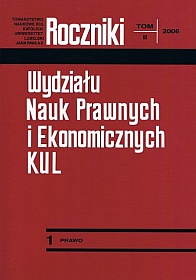Offences Against Family in Code of Chief And Correctional Penalties As of 1847
Abstract
The study comprises an introduction, main body, and a conclusion.
In the introductory part presented is the issue of Code of Chief and Correctional Penalties introduced in Autonomous Polish Kingdom by the decree of 1 January, 1847, in place of the current Polish Penal Law of 1818. The author discusses the principles underlying the nature of crime, punishment, responsibility, and a system of penalties which is to act as a deterrent. The article presents the state of research, sources and literature of the subject, as well as the aim of the study.
The article comprises three parts. They deal with offences against life, matrimony and parental authority, caretaker's authority, and legal guardianship. The discussed offences against life include: patricide, killing of a family member, killing of a pregnant woman, infanticide, abortion, abandonment of a child, and suicide. The part that deals with offences against matrimony contains three spheres of offences and misdemeanours, often closely linked with the civil norms of marital law: punishable violation of essential conditions of entering into marriage, punishable violation of legal impediments to marriage, criminal responsibility of parents, guardians and priests for the violation of legal impediments to marriage, and the abuse of marital rights and obligations, as well as sexual offences against family. The last part of the article deals with offences against parental authority, caretaker's authority and guardianship, listing different types of authority abuse, offences committed by children against their parents, and abuse of authority by caretakers and guardians.
The conclusion contains a succinct appraisal and an analysis of the issues in focus.
References
Brus A., Kaczyńska E., Śliwowska W.: Zesłanie i katorga na Syberii w dziejach Polaków 1815-1914, Warszawa 1992.
Budzyński S.: Krótkie podsumowanie Kodeksu Karnego z roku 1847 z Kodeksem z roku 1818 i z Kodeksem pruskim, „Dziennik Powszechny” 1861, nr 5.
Ćwik W.: Wwiedienije russkogo ugołownogo prawa w Carstwie Polskom, „Archiwum Iuridicum Cracoviense” 8(1975).
Doroszewicz W.: Sachalin, t. I-III, tłum. Z. Pietkiewicz, Warszawa 1901.
Historia państwa i prawa Polski, t. III: Od rozbiorów do uwłaszczenia, red. J.Bardach i M. Semkowska-Gluck, Warszawa 1981.
Hube R.: Historia prawa karnego ruskiego, t. I, cz. 2: Panowanie cesarza Mikołaja I i Aleksandra II, Warszawa 1872.
Kaczyńska E.: Syberia największe więzienie świata 1815-1914, Warszawa 1991.
Koczyński M.: Uwagi nad Kodeksem Karnym dla Królestwa Polskiego, wprowadzonym w wykonanie od 1. I . 1848 r., Kraków 1861.
Korobowicz A. Witkowski W.: Historia ustroju i prawa polskiego (1772-1918), wyd. 2, Kraków: Zakamycze 2002.
Maciejowski F.: Wykład prawa karnego w ogólności z zastosowaniem Kodeksu Kar Głównych i Poprawczych z dniem 20 grudnia (1 stycznia) 1848 r. w Królestwie Polskim obowiązującego, tudzież ustawy przewodniej i instrukcji dla sądów, Warszawa 1848.
Makowski W.: Prawo karne. Wykład porównawczy prawa karnego austriackiego, niemieckiego i rosyjskiego obowiązującego w Polsce, t. I: Część ogólna, b.m.w. 1919, t. II: O przestępstwach w szczególności, b.m.w. 1924.
Maksimow S.: Syberia i ciężkie roboty (Sibir i katorga), tłum. z 2. wyd. Z. Pietkiewicz, t. I-III, Warszawa 1920.
Marchland J.: Prawo kryminalne rosyjskie, Wilno 1918.
Mogielnicki A.: Kary dodatkowe, kary cielesne, kary hańbiące, Warszawa 1907.
Muszalski E.: Prawo cywilne obowiązujące w b. Królestwie Kongresowym. Prawo osobowe i familijne. Prawo rzeczowe, Warszawa 1932.
Sójka-Zielińska K.: Historia prawa, wyd. 8, Warszawa 2000.
Wielowiejski W.: O różnicy między śmiercią cywilną z Kodeksu Napoleona a pozbawieniem wszelkich praw z Kodeksu Kar Głównych i Poprawczych z r. 1847..., „Przegląd Sądowy” 1(1868).
Copyright (c) 2006 Roczniki Wydziału Nauk Prawnych i Ekonomicznych KUL

This work is licensed under a Creative Commons Attribution-NonCommercial-NoDerivatives 4.0 International License.

